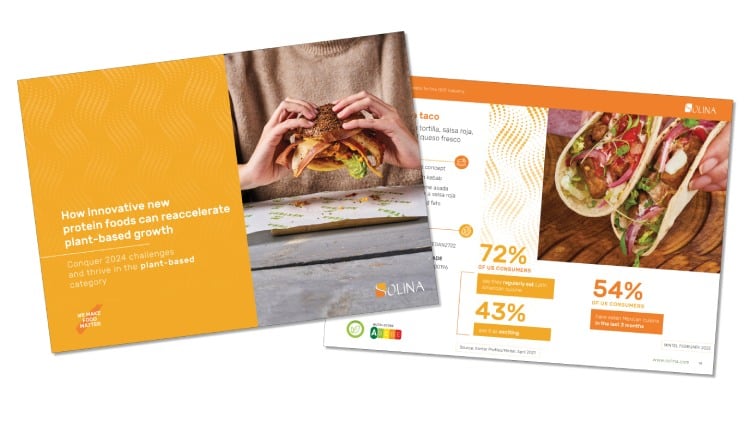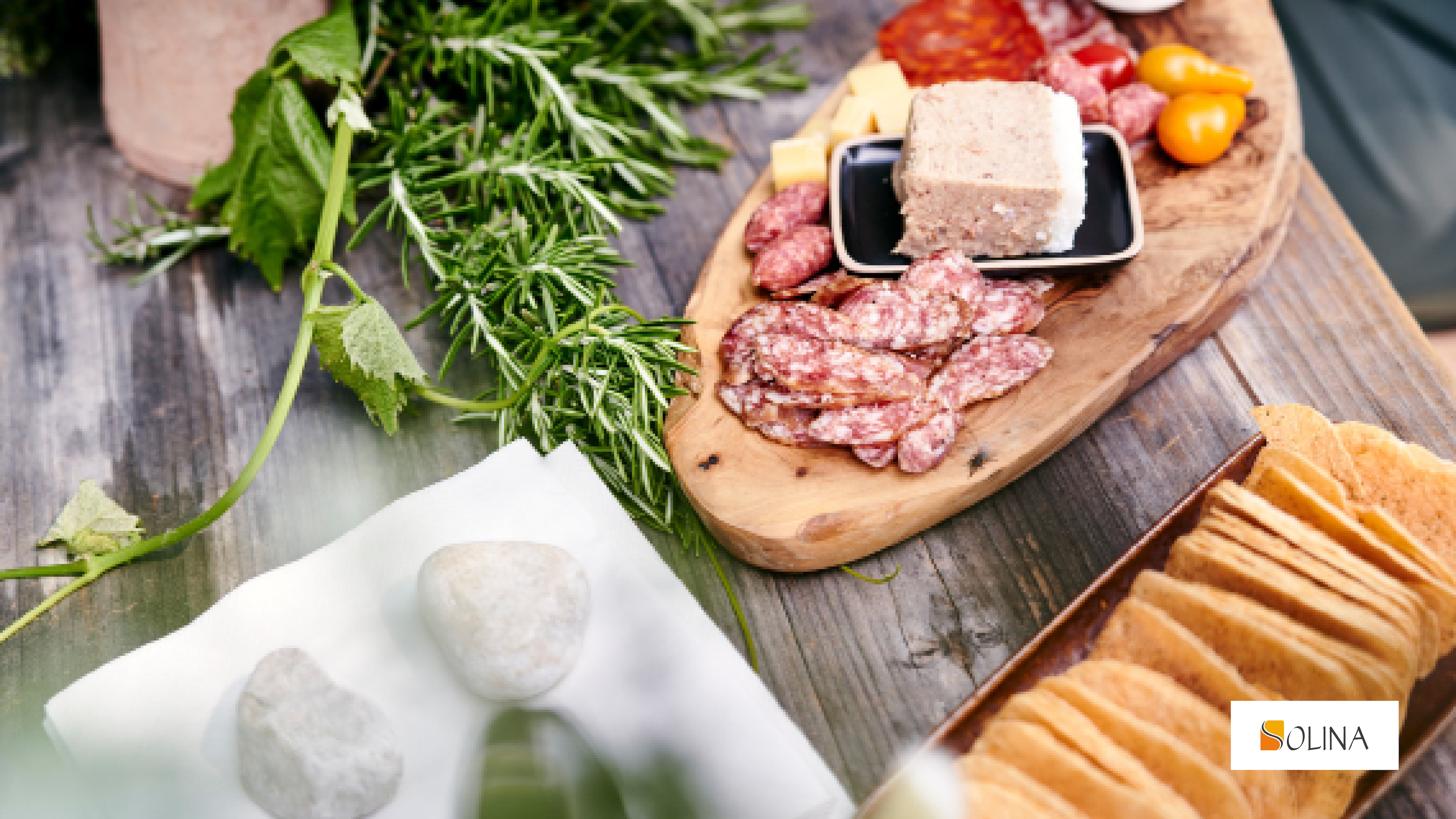The plant-based protein market is entering a new phase. A market that initially attracted early adopters is now serving more than half the population, mainly for health, environmental and/or ethical reasons. The expansion beyond early adopters raised the bar for taste, texture and nutrition, creating a competitive edge for brands that deliver the sensory properties flexitarians want from meat-like products. Solina has founded NEXTERA to help brands rise to that challenge.
The commercial opportunity for plant-based proteins that satisfy consumer demands on texture and taste is significant and growing rapidly. From 2014 to 2019, the European market for meat substitutes roughly doubled in size, according to Euromonitor. The market is predicted to maintain that rate of growth, doubling every five years or so to be worth €2.4 billion by 2024.
There are reasons to think the market will become much bigger. At €2.4 billion, European sales of plant-based alternatives will be 3% the size of the region’s processed meat industry. In other sectors, notably plant-based milks, alternatives to animal products have claimed more than 3% of the market and research suggests further meat sector penetration is possible. One study found one-third of people would choose a plant-based burger if it cost and tasted the same as a meat product.1
Converting one-third of European processed meat sales to plant-based alternatives is a multi-billion euro market opportunity. Food brands that try to seize that opportunity will benefit from consumer perceptions of the health, environmental and ethical benefits of plant-based diets, which are driving around half of Europeans to “regularly switch to meat-free days.”2,3
Yet, food brands need to do more than appeal to the moral and ethical motivations of consumers. To achieve a double-digit share of the processed meat market, developers of plant-based proteins need to satisfy consumer demands on taste, texture and nutrition. A 2019 survey of 24,000 Europeans identified taste as the top repeat purchase criteria for food purchases.4 Another study found sensory attractiveness is a key barrier to uptake of plant-based proteins.5
Manufacturers have made progress in trying to bring that barrier down in recent years. However, the off, sometimes bitter, flavours associated with many plant-based proteins and the broader problem of their lack of meat-like tastes and textures are yet to be fully resolved. There remains a need for the input of independent and objective experts in the taste and texture of meat who have the knowhow and all the main technologies to convert protein raw materials to the requested (semi-) finished product, optimised in taste, texture appearance and nutrition. Solina created NEXTERA to address that need.
Developing new protein foods
Solina has decades of experience of imbuing food products with desired sensory properties. With a big focus on meat, Solina has grown into a leading provider for the savoury food industry with over 18,000 customers. Solina, recognising the value of its skillset to the plant-based protein industry, has set up a sub-division dedicated to supporting developers of new protein foods.
The sub-brand, NEXTERA, is partnering with food companies to apply its expertise in new protein foods to co-develop complete plant-based food concepts. In doing so, NEXTERA is using the taste, functional and nutritional solutions of its parent company Solina to address the remaining sensory barriers to widespread consumption of plant-based proteins while placing a strong emphasis on responsible procurement and sustainable agriculture.
NEXTERA’s offering is built around core pillars that span the entire value chain. Firstly, NEXTERA uses its consumer and market understanding to propose new protein food concepts that resonate with the public. Those concepts are translated into recipes by culinary chefs who work with experts in R&D, processing technology and nutrition to ensure products meet the needs of consumers and brands alike. NEXTERA has a state-of-the-art research centre with a pilot plant that includes all the main technologies, equipping it to give fully independent and objective customised guidance on protein mixes, technologies and ingredient solutions.
Moreover, NEXTERA has a culinary kitchen to house its team of experts. Those capabilities are packaged into a complete offer that pairs Solina’s protein heritage and expertise in taste, functional and nutritional ingredients to a comprehensive service level. Based on these elements and its customer-centricity, NEXTERA is your flexible end-to-end solution partner, with only one single point of contact.
With a portfolio that includes seasonings, sauces, marinades, coatings and any other taste solutions, NEXTERA can deploy its expertise in plant-based proteins to create a wide range of products including burgers, stir fries, stews, pasta dishes, ready meals such as lasagne and breaded escalopes, and spreads and salads for sandwiches.
NEXTERA focuses on taste, nutrition and sustainability when developing its products, ensuring its goals are in line with the priorities of buyers of plant-based proteins. That alignment, coupled to the deep expertise of Solina, positions NEXTERA to help develop the next wave of new protein foods and in doing so realise the world-changing, multi-billion-euro potential of the plant-based protein market.
References
1. Slade, P. If you build it, will they eat it? Consumer preferences for plant-based and cultured meat burgers. Appetite 125, 428–437 (2018).
2. Errendal, S. An Exploration of Diet Factors Motivating Flexitarians, Vegetarians, and Vegans in Loma Linda and Copenhagen, to Foster a More Plant-Based Copenhagen. (2019) doi:10.13140/RG.2.2.29414.88640.
3. 50% of European Consumers Are Consciously Cutting Out Meat, Says New Report. https://www.livekindly.co/half-european-consumers-consciously-cutting-out-meat/ (2018).
4. Veganz Nutrition Survey 2019 – 15 european countries, one survey! https://veganz.com/veganznutritionsurvey/.
5. Hoek, A. C. et al. Replacement of meat by meat substitutes. A survey on person- and product-related factors in consumer acceptance. Appetite 56, 662–673 (2011).








